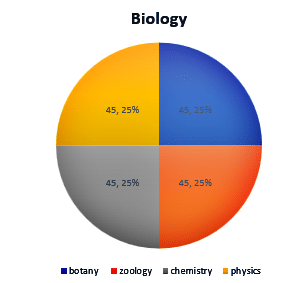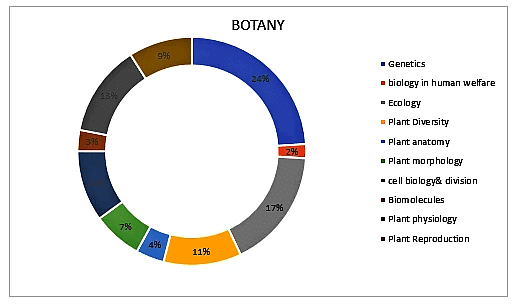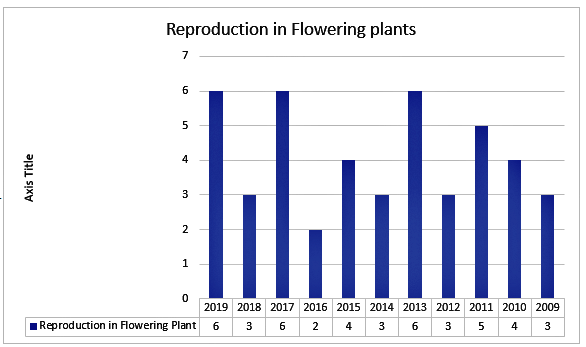NEET Botany Preparation Tips 2024: Important Topics PDF Download
Botany Overview
- Biology consists of two main branches: botany, which focuses on the scientific study of plants, and zoology, which deals with the study of animals. While botany primarily investigates plants, recent advancements in scientific knowledge have expanded the scope to include a wide range of organisms, including viruses and bacteria.
- Both botany and zoology are equally important and carry the same weightage in terms of questions and marks. Therefore, students aspiring to excel in these subjects should dedicate equal efforts to studying both branches.

- To excel in biology, it is crucial for students to start building a strong foundation from Class 11 onwards. The syllabus for biology in competitive exams like NEET includes an equal distribution of topics from both Class 11 and Class 12.
- For NEET Biology preparation, candidates should focus on thoroughly understanding the concepts covered in the NCERT textbooks. The syllabus and questions in the exam are largely based on the content provided in these textbooks. Previous years' question papers for NEET have shown an increasing level of difficulty over time, highlighting the importance of comprehensive preparation.
Botany - Important Topics
Considering the weightage and frequency of questions over the years, the following topics are crucial for the preparation of botany:
- Physiology - Plant
- Reproduction - Flowering Plants
- Plant Diversity
- Ecology
- Structural Organization in Living Organisms
- Cell Structure and Function
- Genetics

Among these chapters, Genetics carries the highest marks, indicating its importance in the exam. Therefore, students should allocate more focus and time to studying genetics. It is also advisable to practice numerical problems related to genetics, including pedigree charts, as they have been previously asked in the exam.
When learning about plant physiology, utilizing diagrams can greatly enhance understanding. Visual representations aid in comprehending complex processes and concepts.
For the topic of plant diversity, it is beneficial to employ flow charts and tables for better organization and retention of information. These tools can assist in categorizing and understanding the vast variety of plants.
Overall, it is essential for students to pay attention to these important topics and employ effective study techniques to excel in botany for competitive exams like NEET.
Prepare tables and flowcharts:
- Charts and tables are highly effective tools for learning botany, especially when preparing for exams. They facilitate quick revision strategies, enabling students to review key concepts efficiently before their exams.
- One area where charts and tables are particularly useful is in the classification of the plant kingdom. Learning the various groups and categories can be made easier by utilizing mnemonic devices, which are often included in study notes or covered in video lectures by teachers. These mnemonic techniques help in remembering and organizing the information effectively. Additionally, it is beneficial to include important applications and examples within these charts and tables, as this provides a practical context and aids in understanding the concepts better.
- EduRev provides comprehensive study materials that incorporate pie charts, diagrams, and tables, making it easier for students to memorize and comprehend the topics. These visual aids assist in visualizing and internalizing the information, enhancing the overall learning experience.
- In summary, utilizing charts and tables, along with mnemonic devices and practical examples, is an excellent approach to learn and revise botany effectively. These tools, combined with quality study materials like those provided by EduRev, can significantly enhance a student's understanding and retention of botany concepts.
Practice and repeat learning:
- It is crucial for aspirants preparing for NEET 2020 in the field of biology to cultivate a habit of intensive practice. Practicing consistently not only aids in reinforcing learned concepts but also enhances overall understanding.
- To gain familiarity with the question patterns that may appear in the exam, it is highly recommended to solve a significant number of NEET sample papers and previous year question papers. This practice allows students to gauge the types of questions likely to be asked and become comfortable with the exam format.
- Additionally, it is beneficial to tackle the questions provided at the end of each chapter. These questions are designed to consolidate and clarify the concepts covered in the respective topics. Solving them helps in solidifying one's understanding and identifying any areas that require further study or clarification.
- In summary, aspiring NEET 2020 candidates should prioritize extensive practice as part of their biology preparation. Engaging in regular practice through sample papers, previous year question papers, and end-of-chapter questions enhances familiarity with the exam format and aids in developing a thorough understanding of the subject matter.
Attend the mock tests:
To improve their preparation for NEET Biology, it is advisable for aspirants to engage in numerous mock tests. It is recommended that students participate in all levels of tests organized by EduRev, including chapter level, unit level, and subject level tests. EduRev offers a test series called Doctors Paradise and Doctors Material to students who demonstrate exceptional performance in these tests. These resources serve as valuable tools for enhancing one's readiness for the NEET examination.
Doubt clearance regularly:
Regularly addressing doubts is essential for aspirants. EduRev offers a platform where students can clarify their doubts at every level while preparing and solving questions. Additionally, a new feature has been added to the package, enabling students to view and resolve doubts raised by other students in real-time. This facility enhances the learning experience by fostering an interactive environment where doubts can be promptly resolved.
Revise Regularly:
To fully reap the benefits of studying and practicing, it is crucial to engage in regular revision. This aids in the process of memorization. Candidates should prioritize multiple revisions of the entire syllabus before the exams, ensuring a comprehensive understanding of each concept within each topic. By incorporating regular revision into their routine, students can effectively monitor their progress in their studies.
Unit-1: The Living World
Introduction:
Life can be described as a distinct collection of molecules that have the ability to manifest themselves through a variety of reactions known collectively as metabolic reactions. The primary objective of these reactions is to convert, generate, and utilize energy. The term "metabolism" encompasses these reactions as a whole. Through metabolism, diverse biomolecules are synthesized, leading to processes such as growth, development, responsiveness, adaptations, and reproduction. Living beings, possessing and demonstrating all these traits, inhabit a wide range of habitats, including forests, mountains, deserts, oceans, freshwater bodies, hot springs, and polar regions. They are interconnected through the sharing of a common genetic material. All living beings share fundamental characteristics such as organization, energy utilization, regulation or homeostasis, growth, development, reproduction, and adaptation.
Paper Analysis:
The chapter "The Living World" is relatively less weighted, with only 6 questions being asked in the past 11 years. On average, we can expect a maximum of 1 question from this chapter, typically of a straightforward nature. The appearance of questions in the question paper has been irregular. In 2014 and 2015, no questions were included, while prior to that, questions appeared alternately every year. However, in the last two years, one question has been asked each time, indicating a reasonable chance of a question being asked in the upcoming paper.
The key topics to focus on from this chapter are:
- Taxonomy and Systematics
- Characteristics of Living Organisms
The bar graph below illustrates the number of questions asked in recent papers.

Tips and Tricks:
To efficiently and effectively cover this chapter, which has a relatively low weightage in NEET papers, it is important to follow these tips:
- Begin by reading the NCERT textbook as it provides a solid foundation and ensures clear understanding of the concepts. You can access the chapter's PDF version using this link.
- Creating a mind map of the chapter will aid in revision by organizing and visualizing the key points. Additionally, making flashcards can be beneficial for quick recall of important information.
- It is crucial to solve all the questions from the past 10 years' NEET papers related to this chapter. This practice will familiarize you with the type of questions asked and help you identify any knowledge gaps.
- In addition to solving previous years' questions, it is advisable to practice an ample number of additional questions from this chapter. This will enhance your problem-solving skills and reinforce the concepts.
- Regular revision is essential to ensure that you retain the core content of the chapter. Set a schedule to revise the chapter at least once every two weeks, preventing the information from fading away.
By following these guidelines, you can efficiently cover this chapter, even though it holds a lower weightage in NEET papers.
Unit-2: Structural Organization in Plants
Introduction:
Before conducting experiments, naturalists were able to record observable and perceivable biological phenomena, limiting their work to describing biology. However, the establishment of plant morphology and anatomy provided a wealth of detailed data that greatly aided scientists in understanding and further researching the biological processes and evolution of plants. The upcoming chapters in this unit will delve into the structural organization of plants, covering aspects such as morphology, anatomy, and classification based on these characteristics.
Paper Analysis:
The chapter on structural organization in plants holds moderate weightage, with approximately 5 questions being asked in previous years' exams. It is crucial to thoroughly study this unit, as although it may require a substantial amount of memorization, doing so increases the likelihood of scoring full marks in the questions related to this topic. Considering its significance in the botany section, it is reasonable to expect around 5 questions from this unit in the upcoming NEET exam.
The following chapters are important and should be covered in this unit:
- Anatomy of flowering plants
- Morphology of flowering plants
Tips and Tricks:
It is imperative to dedicate sufficient time and effort to thoroughly study this unit, delving into its content with great detail and ensuring complete retention of the features of different divisions. It is crucial to remember not only the general characteristics but also specific examples and unique features of important plants within each division.
Unit-3: Cell Biology
Introduction:
Cell Biology is a specialized field within biology that focuses on exploring the structure and functionality of cells, which serve as the fundamental building blocks of life. This branch of science delves into the physiological characteristics, metabolic processes, signaling pathways, life cycles, chemical composition, and interactions of cells with their surrounding environment.
Syllabus
Environmental issues encompass a range of concerns, including air pollution and its mitigation, water pollution and its control, the impact of agrochemicals, management of solid and radioactive waste, the greenhouse effect and global warming, ozone depletion, and the problem of deforestation. In addition, it is worthwhile to explore successful case studies that highlight effective approaches in addressing these environmental challenges.
Paper Analysis:
This particular chapter holds significant importance in the NEET syllabus, with a total of 39 questions having been asked in the past 11 years. It stands out as one of the most crucial chapters to focus on. Only in 2017 did the question count drop below 3, while all other years had at least 3 questions dedicated to this topic. Notably, the past two years witnessed a higher count of 7 questions. Therefore, it is reasonable to expect around 3-4 questions from this chapter in the upcoming NEET exam. The accompanying graph visually represents the analysis discussed above.

To adequately prepare for this chapter, it is essential to cover the following important topics:
- Cell Theory and the Cell as the Basic Unit of Life
- Structure of Prokaryotic and Eukaryotic Cells
- Comparison between Plant Cells and Animal Cells
- Differentiating between Cell Membrane and Cell Wall
- Cell Organelles: Structure and Function
Unit-4: Plant Physiology
Introduction:
- Plant anatomy and morphology provide descriptions of plants at an organismic and structural level of organization. On the other hand, the study of plant functioning and biological processes takes place at a cellular and molecular level of organization. This differentiation led to the development of ecology and related disciplines, focusing on the broader ecological interactions of plants, while biochemistry and physiology emerged to explore the cellular and molecular mechanisms within plants.
- In the upcoming chapters of this unit, you will delve into the physiological processes occurring in flowering plants. These processes include photosynthesis, respiration, transport and mineral nutrition, as well as growth and development, all of which are examined at a cellular level to understand the intricate mechanisms at play.
Paper Analysis:
Plant physiology holds immense significance in the NEET exam, as it is a high-weightage unit with a substantial number of questions being asked. This unit is crucial due to its weightage in the exam. In the previous year, a total of 9 questions were dedicated to this unit, indicating that we can expect at least 7 questions from this unit in the upcoming NEET exam. It is essential to thoroughly learn all the necessary details and develop a comprehensive understanding of the processes and phenomena within this unit. By mastering this unit, you can confidently aim to score at least 28 marks in the biology section.
The following chapters are particularly important and should be covered in this unit:
- Transport in Plants
- Mineral Nutrition
- Photosynthesis in Higher Plants
- Respiration in Plants
- Plant Growth and Development
Tips and Tricks:
- Plant physiology is an intriguing chapter that becomes even more important due to its significant weightage in the exam. It is essential to approach this chapter with a mindful and thorough study strategy. One advantage of this chapter is that it allows for understanding processes rather than simply memorizing them.
- To strengthen your foundation in this unit, begin by following the NCERT textbook diligently. Read it line-by-line, highlighting important points and processes along the way. Additionally, take advantage of the numerous video animations available online. These resources can greatly aid in understanding and memorizing various aspects of the unit, making the learning experience more engaging.
- Creating side-notes for the different processes within this chapter is highly recommended. These notes will serve as valuable reference material for quick revision. Additionally, drawing important cycles, including the reagents, products, enzymes, and catalysts, if applicable, can help visualize and understand these processes better.
- For hormones, make concise summaries of their functions and key points to facilitate easier retention and revision.
- Lastly, frequent revision is crucial for this detailed and extensive unit. Make sure to revise your notes regularly to reinforce your understanding and prevent forgetting important information.
 |
Download the notes
NEET Botany Preparation Tips 2024: Important Topics
|
Download as PDF |
Unit-5: Reproduction in Plants
Introduction:
Angiosperms, commonly known as flowering plants, are characterized by having sex organs located within their flowers, and their seeds are enclosed within fruits. These plants primarily reproduce through the method of sexual reproduction. Similar to humans, flowering plants possess distinct male and female sex organs, albeit with different forms. These reproductive organs are housed within the flowers of the plant. Flowers serve the purpose of producing male and female gametes, facilitating fertilization and the production of new seeds for plant reproduction. Sexual reproduction is the prevalent method of reproduction in flowering plants, with flowers generating both the male and female gametes required for this process.
Paper Analysis:
The chapter "Reproduction in Flowering Plant" holds significant importance for the NEET exam. Over the past 10 years, a total of 45 questions have been asked from this chapter, averaging more than 4 questions per year. In the previous year, the number of questions increased, with a total of 6 questions being asked. With the exception of 2016, each year has seen 3 or more questions being asked, emphasizing the need to thoroughly prepare for this chapter. Therefore, it is reasonable to expect around 5-6 questions in the upcoming paper.
The following bar-graphs provide a visual representation of the question pattern in the last 10 years.
To excel in this chapter, it is essential to dedicate sincere and focused preparation. The following topics should be given utmost attention:
- Flower Structure
- Pollination
- Double Fertilization
- Post-Fertilization Events
- Development of Seeds and Formation of Fruits
- Special Modes of Reproduction - Apomixis, Parthenocarpy, and Polyembryony
Tips and Tricks:
To effectively prepare for the heavy-weight chapter of "Reproduction in Flowering Plant," it is essential to approach it with utmost dedication and sincerity. The following tips and tricks can prove helpful in your preparation:
- Begin by studying the NCERT book, as it provides a solid foundation for further reading. Make sure to go through the chapter thoroughly. You can access the PDF version of the NCERT book for this chapter.
- Supplement your learning with interactive animations and video lectures available online. These resources can offer a clearer understanding of complex concepts and processes.
- Pay close attention to the diagrams in the chapter. Understand each part and its significance. Regularly practice redrawing the diagrams to reinforce your memory of the different components.
- Create mnemonics or memory aids for various steps and processes. Mnemonics can help simplify complex information and make it easier to remember, transforming your hard work into smart work.
- Solve previous year question papers to familiarize yourself with the types of questions that can be expected in the upcoming exam. This practice will also help you gauge your preparedness and identify any areas that require further attention.
By following these tips and dedicating ample time and effort to studying and practicing, you can enhance your preparation for the "Reproduction in Flowering Plant" chapter.
Unit-6: Genetics
Introduction:
The theory of genetics holds immense significance in various fields and aspects of biology, thanks to the pioneering work of Gregor J. Mendel and subsequent researchers who conducted experiments on genetic inheritance. Their work laid the foundation for modern-day genetics. In the upcoming chapters of this unit, you will delve into the structural basis of changes in genotype and phenotype. Additionally, you will explore the structure and function of genetic material, specifically DNA.
Paper Analysis:
This unit in botany stands out as one of the most crucial and high-scoring units among others. While there are certain aspects within this unit that require memorization, there are also numerous topics that demand a deep understanding. Once you have a thorough comprehension of these topics by studying them in detail, answering questions related to them becomes relatively easier. It is absolutely essential to master this unit, as it comprised 10 questions in the previous year and a similar number in previous years as well. Therefore, it is reasonable to expect at least 7 questions from this unit in the upcoming exam.
The following chapters are particularly important and should be covered in this unit:
- Principles of Inheritance and Variation
- Molecular Basis of Inheritance
Tips and Tricks:
- To effectively study this unit, it is crucial to go through the content in detail, ensuring a comprehensive understanding of all the basic concepts and phenomena. Alongside understanding, memorization of key information will also be necessary.
- Begin by meticulously reading the NCERT book line-by-line. Focus on comprehending the concepts and phenomena described, and make an effort to memorize important lines or points that are highlighted.
- Dive into the experiments conducted in this unit, carefully examining each one. Seek to understand the process and reasoning behind the outcomes of these experiments.
- Flow charts and tables can be useful tools for visualizing and organizing concepts, especially when dealing with crosses or other complex ideas. Utilize these visual aids to enhance your understanding.
- Solving questions from previous year question papers is highly recommended. This practice will familiarize you with the types of questions asked in the exam and help you apply your knowledge effectively.
- Regular revision is crucial. Set aside time to revisit the concepts periodically, reinforcing your understanding and memory of the material.
Unit-7: biology and human welfare
Introduction:
Biology, as a discipline of natural science, holds immense significance for humankind. While its applications in our daily lives may seem limited, they have had a profound impact on various aspects of human welfare. In the upcoming chapters of this unit, you will explore the utilization of biological knowledge in areas such as antibiotics or drugs, diagnostics, agriculture, food processing, and more. These applications have not only brought about socio-economic changes but have also contributed to improving the well-being of individuals and society as a whole.
Paper Analysis:
The unit we are discussing has proven to be highly important in the NEET exam, with a range of 4 to 8 questions being asked in recent years. Scoring well in this unit is crucial for achieving a good overall score. While this unit requires memorization of various factual details, it is generally considered less boring and less challenging compared to some other units.
The unit encompasses the following chapters:
- Human Health and Disease
- Strategies for Enhancement in Food Production
- Microbes in Human Welfare
These chapters delve into topics related to human health, agricultural practices, and the beneficial roles of microorganisms in human well-being. Mastery of these chapters will contribute significantly to one's preparation for the exam.
Tips and Tricks:
In this unit, it is important to recognize that while it primarily consists of fact-based information that requires extensive memorization, it is not overly challenging. By focusing on this unit with dedication and proper preparation, you can significantly improve your scoring potential.
To effectively prepare for this unit, consider the following strategies:
- Thoroughly study the NCERT book, paying close attention to each line and concept. Some exam questions are directly extracted from the NCERT book without alteration.
- Solve previous year question papers to familiarize yourself with the types of questions typically asked in the exam. This will help you understand the exam pattern and prepare accordingly.
- Create concise and summarized notes specifically for this unit. These notes should capture the key points, important details, and significant concepts to aid in efficient revision.
- Memorize specific pathogens, recent diseases, types of immunity, and any newly discovered vaccines that are relevant to the unit. Being well-versed in these details can enhance your understanding and ability to answer related questions accurately.
- Regularly revise the material to reinforce your knowledge. Frequent revision sessions will help you retain the information and ensure better retention.
By following these strategies, you can effectively prepare for this fact-based unit and increase your chances of scoring higher in the exam.
Unit-8: Ecology and Environment
Introduction:
Ecology, as a branch of biology, focuses on studying the intricate relationships and interactions between living organisms and their surrounding environment. It delves into the dynamics of populations, communities, and ecosystems, providing insights into their functioning and interdependencies. Within this unit, you will explore the realm of anthropogenic environmental degradation and the associated socio-political issues that arise as a result.
Through the upcoming chapters, you will gain knowledge about the study of human-induced ecological changes and the broader implications they have on our environment. This will involve examining the various factors contributing to environmental degradation, understanding the consequences for both natural systems and society, and exploring potential solutions and management strategies. By comprehending these aspects, you will develop a deeper awareness of the complex dynamics between humans and the environment, enabling you to contribute to sustainable practices and environmental stewardship.
Paper Analysis:
- It is crucial to dedicate sufficient time and effort to master this unit, as evident from the weightage it holds in the NEET exam. Accounting for approximately 13% of the overall exam, this unit demands focused attention and thorough preparation. While it may seem challenging to grasp due to the need for memorizing specific details, the rewards are significant.
- By reviewing previous year question papers, you will gain a better understanding of the importance of mastering this unit. In the previous year's exam, there were 8 questions dedicated to this unit, indicating its significance in the assessment. Based on the trend observed in recent years, it is reasonable to anticipate around 6 questions from this unit in the upcoming exam.
- The unit comprises several chapters, namely "Organisms and Populations," "Ecosystem," "Biodiversity and Conservation," and "Environmental Issues." Each chapter offers valuable insights into ecological principles, population dynamics, the interplay of organisms within ecosystems, biodiversity preservation, and environmental challenges.
- To excel in this unit, it is recommended to thoroughly study the NCERT book, understand the concepts in detail, and make concise notes. Focus on memorizing key points, specific examples, and case studies related to biodiversity and environmental issues. Regular revision is essential to reinforce your understanding and retention of the subject matter.
- By diligently preparing for this unit, you will equip yourself with the knowledge and understanding necessary to address ecological challenges and contribute to the conservation and sustainable management of our environment.
Tips and Tricks:
- Mastering this unit requires dedicated effort and a strong commitment to memorizing specific facts. While the unit is vast and challenging, the rewards for thorough preparation are significant.
- To excel in this unit, it is crucial to thoroughly study the concepts outlined in the NCERT book. Understanding the core principles and ideas will form a solid foundation for further exploration. Additionally, referring to case studies can provide valuable insights and real-world applications of ecological concepts.
- Keeping yourself updated with recent environmental issues and the efforts made to address them is essential. Stay informed about ongoing initiatives and advancements in the field, as this knowledge can contribute to a comprehensive understanding of the subject.
- Practicing previous year question papers is an effective strategy to familiarize yourself with the question pattern and types commonly encountered in the exam. Be prepared for graphical, diagrammatic, numerical, and reasoning-based questions. Pay close attention to these question formats and ensure you are comfortable with solving them.
- Regular revision is crucial in this unit due to its fact-based nature. Review your notes frequently to reinforce your understanding and commit key details to memory. Consider using mnemonic techniques or other memory aids to facilitate retention.
- By following these strategies and investing dedicated effort, you will enhance your mastery of this unit and be well-prepared to tackle questions related to ecology in the NEET exam.






















